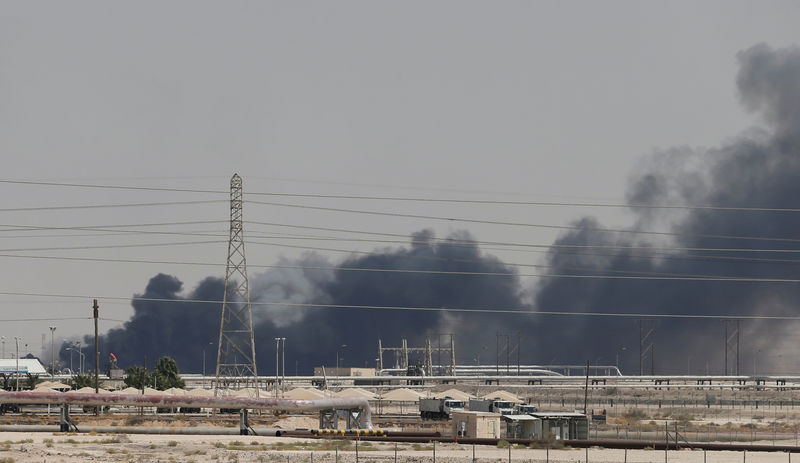By Rania El Gamal and Ron Bousso
DUBAI/LONDON (Reuters) - Saudi Aramco is buying oil originating in neighbouring countries to meet its supply obligations to foreign refineries, sources familiar with the matter told Reuters, after crippling attacks on the company's installations 10 days ago.
The state firm's trading arm is arranging for crude from the United Arab Emirates and Kuwait to cover its commitments to refineries outside the kingdom such as in neighbouring Bahrain as well as Malaysia and South Korea, the sources said.
Aramco Trading Corp (ATC) did not immediately respond to a request for comment.
Drone and missile attacks on two facilities that process mainly light crude knocked down about 5.7 million barrels per day, more than half of the production of the world's top oil exporter.
Though the kingdom said it would restore full oil output by next week, it is seeking help from fellow Gulf Arab producers to keep its customers supplied and plug any gaps due to the temporary shortage, the sources said.
Even before the attacks, ATC used to buy and trade third-party crude from the market and swap it for oil products, but the sources said the kingdom’s reduced oil output had increased ATC’s demand for non-Saudi crude.
ATC was arranging modest shipments of Emirati crude to Bahrain's refinery and other plants from Abu Dhabi's state oil company, two sources said.
"ADNOC (Abu Dhabi National Oil Co) will send 2-3 million (barrels) of Murban into Bahrain," a source said, citing one of the UAE's main grades of light crude.
"We also saw Murban going to Saudi Malaysia," another source said, referring to Pengerang Refining and Petrochemical (PrefChem), a joint venture between Malaysian national oil company Petronas and Aramco.
A spokesperson for ADNOC declined to comment.
ATC is also buying crude from the market to feed South Korea's third-largest refinery, S-Oil, with which Aramco is partnered in a joint venture.
Emirati and Kuwaiti oil is being provided to S-Oil via trading houses including BP (L:BP), the sources added. BP declined a Reuters request for comment.
ATC also bought Omani crude, one market source said. The company is looking to import condensate from the market, sources said.
Saudi Arabia will not import crude to meet its domestic needs, one source said.
"Why do that (when) we have crude storage?"
Saudi oil exports were proceeding, the source added, "exactly like they were (before) to meet the market's needs".
